|
|
|
Sort Order |
|
|
|
Items / Page
|
|
|
|
|
|
|
| Srl | Item |
| 1 |
ID:
174943
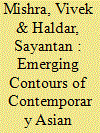

|
|
|
|
|
| Summary/Abstract |
This article intends to look at how contemporary and future Asian connectivity linkages are likely to impact Asian geopolitics and geo-strategy. While China has dominated the contemporary connectivity discourse with its Belt and Road Initiative (BRI), other players such as Australia, India, Japan and the USA are engaged in their own connectivity bids which often converge and intersect in the region. As a result, the countries involved in the Indo-Pacific cross-linkages are tacitly entering a game of one-upmanship. Influence through connectivity linkages has also shifted the discourse around balance of power for countries to balance of influence. It is in this context that initiatives such as the Mausam find centrality in the country’s changing outlook. This article attempts to look at Asian connectivity from a dual perspective of economic competition, on one hand, and strategic calculations, on the other hand. The scope of the article is limited to analysing China, India and Japan as leading Asian countries in the emerging connectivity competition, besides the USA as the most important external players in Asian connectivity geopolitics and geo-strategy.
|
|
|
|
|
|
|
|
|
|
|
|
|
|
|
|
| 2 |
ID:
187136
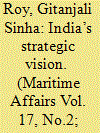

|
|
|
|
|
| Summary/Abstract |
K.M. Panikkar’s understanding of India’s strategic vision for the Indian Ocean highlighted the strategic dots of Socotra and Indonesia, which were a part of a larger game plan of a “strategic arc”. His idea of Socotra and Indonesia was based on the linkage between the two strategic sea lanes of communication. In the present context, Panikkar’s strategic arc has been readopted in Prime Minister Narendra Modi’s new vision, which aims to pave the way for India to engage in friendly ports so as to create a network of strategic ports for defence and civilian purposes. This article endeavours to understand Panikkar’s “strategic arc”, traced from the east coast of Africa to the island of Sumatra. Further, it analyses how Panikkar’s strategic arc has been realigned and reinvigorated in the present scenario from Oman to the islands of Indonesia, which helps in furthering India’s economic interests as well as protect its strategic well-being. The article concludes by offering a set of policy recommendations based on Panikkar’s strategic arc and how these could be inculcated within the larger framework on India’s security and maritime policy.
|
|
|
|
|
|
|
|
|
|
|
|
|
|
|
|
| 3 |
ID:
144669
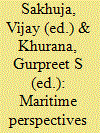

|
|
|
|
|
| Publication |
New Delhi, National Maritime Foundation, 2016.
|
| Description |
331p.pbk
|
| Standard Number |
9788193015957
|
|
|
|
|
|
|
|
|
|
|
|
Copies: C:1/I:0,R:0,Q:0
Circulation
| Accession# | Call# | Current Location | Status | Policy | Location |
| 058645 | 359/SAK 058645 | Main | On Shelf | General | |
|
|
|
|
| 4 |
ID:
174942
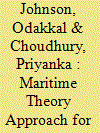

|
|
|
|
|
| Summary/Abstract |
The Indo-Pacific region is a centre of gravity for the world’s economic, political and strategic interests. It is a home of world’s most densely inhabited states, different forms of governance and includes over half of the world’s population. It is also a theatre of great power politics, competition and rivalry. Piracy in the vital choke points, dispute on the South China Sea and rising China factor in the Indian Ocean are some of the challenges faced in this region. As the maritime domain is unique, cooperation among nations is necessary to ensure peace in the region. Therefore, a maritime theory approach is needed to study good order at sea.
|
|
|
|
|
|
|
|
|
|
|
|
|
|
|
|
| 5 |
ID:
148058


|
|
|
|
|
| Summary/Abstract |
The Bay of Bengal is of vital strategic, economic and maritime importance, as the Andaman Sea and the Malacca Straits link South and Southeast Asia. The Bay is intrinsically rich in hydrocarbons and minerals. Several major rivers of Asia flow into the Bay and the adjoining seas creating vast sedimentary basins that have potential hydrocarbon deposits. The growing role of the Bay of Bengal as a reservoir of vital resources has contributed to the regional powers’ ability to exert influence in this arena. The changing dynamics are particularly relevant for India and China, whose rising economies are dependent on the steady flow of resources, most importantly oil. The geopolitics of the increasingly volatile South China Sea could possibly impact on India’s interests and relations with Southeast Asian countries. This paper examines whether China and India’s Indian Ocean strategies underpin greater cooperation, rather than competition to generate synergies in the region.
|
|
|
|
|
|
|
|
|
|
|
|
|
|
|
|
| 6 |
ID:
147979
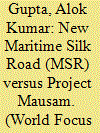

|
|
|
|
|
| Summary/Abstract |
Alfred Thayer Mahan in his book The Influence of Sea Power upon History 1660-1783 most famously presented his concept of ‘sea power’ which was based on the idea that countries with greater naval power will have greater worldwide impact. His concept had an enormous influence in shaping the strategic thought of navies across the world, especially those of United States, Germany, Japan and Great Britain. His concept ultimately led to European naval arms race in the 1890s. It was indeed a revolutionary analysis of the importance of naval power as a factor in the rise of the British Empire. Mahan’s argument that British control over the seas, combined with a corresponding decline in the naval strength of its major European rivals paved the way for Great Britain’s emergence as the world’s dominant military, political and economic power.
|
|
|
|
|
|
|
|
|
|
|
|
|
|
|
|
| 7 |
ID:
135453


|
|
|
|
|
| Summary/Abstract |
Effectively predicting a Nation’s future requires a broad mind and an objective vision. It requires nuanced examination of various factors, a careful analysis of the gestures of the leader and the government, the language, the actions, the people, the perceptions et-al. While analyzing them, best effort has been put into finding an answer to a series of interesting questions beginning with the question- Why Prophecies on India have failed since and before India’s Independence. The article presents an objective analysis of the Prime-Ministership and allied factors shaping India’s diplomatic course and her future.
|
|
|
|
|
|
|
|
|
|
|
|
|
|
|
|
|
|
|
|
|